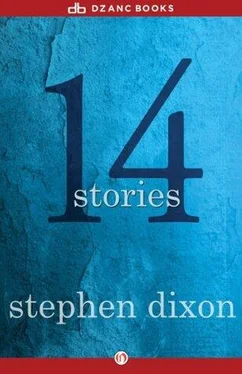Stephen Dixon - 14 Stories
Здесь есть возможность читать онлайн «Stephen Dixon - 14 Stories» весь текст электронной книги совершенно бесплатно (целиком полную версию без сокращений). В некоторых случаях можно слушать аудио, скачать через торрент в формате fb2 и присутствует краткое содержание. Год выпуска: 2013, Издательство: Dzanc Books, Жанр: Современная проза, на английском языке. Описание произведения, (предисловие) а так же отзывы посетителей доступны на портале библиотеки ЛибКат.
- Название:14 Stories
- Автор:
- Издательство:Dzanc Books
- Жанр:
- Год:2013
- ISBN:нет данных
- Рейтинг книги:5 / 5. Голосов: 1
-
Избранное:Добавить в избранное
- Отзывы:
-
Ваша оценка:
- 100
- 1
- 2
- 3
- 4
- 5
14 Stories: краткое содержание, описание и аннотация
Предлагаем к чтению аннотацию, описание, краткое содержание или предисловие (зависит от того, что написал сам автор книги «14 Stories»). Если вы не нашли необходимую информацию о книге — напишите в комментариях, мы постараемся отыскать её.
14 Stories — читать онлайн бесплатно полную книгу (весь текст) целиком
Ниже представлен текст книги, разбитый по страницам. Система сохранения места последней прочитанной страницы, позволяет с удобством читать онлайн бесплатно книгу «14 Stories», без необходимости каждый раз заново искать на чём Вы остановились. Поставьте закладку, и сможете в любой момент перейти на страницу, на которой закончили чтение.
Интервал:
Закладка:
My mother knocks on my bedroom door. “I’m setting a place for dinner for you tonight, and don’t say no.”
“Not hungry now, ma, thanks.” I exercise, shower, dress. It’s still light out. The folks are at the dinner table. “Sit down,” dad says. I wash the cooking utensils that are in the sink, kiss my parents on the cheek and go to the park, sit by the lake, draw an abandoned rowboat, jog for a mile, watch the carousel close and the tail end of a women’s softball game, draw a catcher’s mitt and mask on the grass, buy sweet creamy pastries for my mother, dietetic cookies for my father, go to that same grocery store for fresh green beans and a four-pack of stout. Would I speak to her if she were here now? “You wouldn’t,” a friend recently said about something else, “because you never want to see your fantasies end,” but I don’t think he’s right. I wouldn’t speak to her without her speaking to me first. She could become repulsed or afraid if I did and I could become embarrassed and suspect in the store I’ve been shopping at for three years. She’d have to drop something and I could stoop to pick it up. Or stretch for something out of reach and I could say “May I help?” After I got whatever it was she reached for or dropped she’d say thank you and I’d mention the school we’re both familiar with and maybe a conversation could then begin. It could continue in the street and that neighborhood bar where I’d invite her for a beer. If she came into the store now I’d only look at her a few times, maybe get into her aisle under the pretense of searching for an item I never do find or for a bottle of chili sauce or vinegar the household could always ultimately use, but no actions if she didn’t elicit them more unguarded or venturous than that.
Next door’s the corner candy store I go into to get the afternoon paper for my dad. He’ll gripe I’m only tossing good money away by buying such a rag but read it from beginning to end including the larger ads. She’s at the magazine rack in back, scanning the magazine covers while gnawing off the chocolate remains of an ice cream-pop stick. I open the paper I’ll buy, look at it as if checking a movie timetable, say huh-huh, and nod while folding the paper in two and pore over the many choices of my favorite candy brand. She’s taking a magazine off the rack. There’s a flavor I’ve never seen anywhere before called pink grapefruit. She slips the licked icecream stick into a back pocket and turns a page. And tangerine, which I think I had in the sour-fruit assortment and found either too tart or sweet. She’s coming front to pay for the magazine and I feel which of my pants pockets has the change. Her bell-bottom white denims have brown buttons for a fly. She isn’t carrying a shoulder bag but extracts a wallet from one of the two breast pockets of her denim workshirt. Sandals I’ve never seen, woven colorful cloth for a belt that’s half-tied, but hair, face, expression and walk all the same. Everything else the same. “Excuse me,” I say, “but would you mind if I took a brief look at the table of contents of your magazine?”
“I’m really in a rush and they’ve plenty more copies back there.”
“It’s just because they are in back and out of the way that I asked, though I don’t see why I should be such a laze. Thanks.”
“Sure.”
I go to the back.
“A dollar,” the proprietor says and she pays up and leaves. I find the same magazine, one I could always read, good author in it and poet I’ve mostly liked, many reviews, elegant ads for places and goods I could never afford, pay for it and the newspaper and pinkgrapefruit candy and wait for my change. Her voice is deeper than I thought it’d be, unaffected, without regionalism or unpleasant twang, pitch or tone and she did seem in a hurry and genuinely sorry she couldn’t help me out.
She’s at the corner in front of the store waiting for the light to change. Traffic’s heavy with lots of zipping cabs, cars, buses and trucks booming downtown one-way. “Judy,” I say. She turns and looks. “Now I know.” She points to her chest as if saying do you mean me? “You see, I used to teach at 54.”
“What?”
“The junior high school there.”
“That long white brick building?”
“You’re Judy Louis, aren’t you?”
“No.”
“But you answered to the name Judy before.”
“My name’s Judy — though Judith, never Judy — but not Louis. You’ve got to have me mistaken for someone else.”
“She graduated two years ago. I’m a sub there and had her class many times. I think it was an SP — a special class for gifted students.”
“Never went there. And gifted I surely never was. I even thought your school was some kind of factory or warehouse or even a prison of sorts — I had no idea. I’m missing my light — excuse me.” She steps off the sidewalk as the light turns red, stays by the curb with her back to me, waiting for the light to change.
“Naturally it must seem silly my pursuing this, but it’s still inconceivable to me how much you look like this girl.”
“I hate being compared to anyone else. I don’t do it to others, but since I don’t know you you wouldn’t know that. I’ve also got to be a lot older than this girl if she was still in grade school two years ago. There’s the coincidence of our first names, I’ll grant you, but it isn’t a very odd first name so it’s really not much of a coincidence after all.”
“But what I find even more curious is that I’ve seen you almost every morning for months and always thought I knew you from somewhere. Till just before when for the first time I felt certain who you were.”
“I’ve seen you too. You walk very fast. Though going to work mornings I see lots of the same strangers from time to time.”
“I don’t. Maybe because the school I teach at is so close to my home.”
“Could be. Though one man downtown I see every day without fail, unless I’m late starting out that morning, is always getting out of the express across the platform as my local’s pulling in. And besides you and some schoolchildren and a lady, there’s a man I see practically every morning going into number 8 up the block as if back from work. And there’s this I’m sure husband-and-wife team who a few times a week are already in the same seats of the first car of the subway I take to work. And of course the I-don’t-know-howmany I repeatedly see climbing out of the station and while I’m walking to my office building and in the elevators up and down and restaurant I’ve my lunch in most days and counter place for my coffee breaks. And quite often I’ll get one or two both coming and going along the same streets and in the same stations and subway cars and stops as mine and all on the same day. It’s a big city, but you’d be surprised. Excuse me, my light.”
“Wait till it turns green again.”
“Why?”
“I don’t know. For your health, or a coffee then, or a beer.”
“Oh, how do I say this? I’m with a man. For a year now. He stays with me. I’m sorry. Nice talking,” and she cuts through traffic to cross the avenue against the light.
I see her the next day. On the opposite sidewalk heading for the subway she’ll take to work. It’s between 8:35 and 8:36. I’ve had the breakfast I have every weekday, given my father his daily insulin shot while he lay mostly asleep in bed, kissed my mother goodbye. “Good morning,” I yell when she’s directly across the street. She looks. I wave. We’re walking. She nods, doesn’t smile, never lingers, hurries on. All the clothes she’s wearing I remember from different ensembles on other warm sunny days. I watch her till she turns right at the park and I don’t see anyone enter or leave any buildings on her side. Nobody else even seemed to be on the street when I yelled. The block’s still empty of people except for two women in a passing car. Now a man leaves 34. Now a girl leaves 46 and a woman blows a kiss to her from a window on the third floor. Now the super’s helper lugs up a garbage can from the basement of the apartment house at the corner called The Delmoor. I’ve seen all these people as I’ve walked to work, though I don’t think more than once a week.
Читать дальшеИнтервал:
Закладка:
Похожие книги на «14 Stories»
Представляем Вашему вниманию похожие книги на «14 Stories» списком для выбора. Мы отобрали схожую по названию и смыслу литературу в надежде предоставить читателям больше вариантов отыскать новые, интересные, ещё непрочитанные произведения.
Обсуждение, отзывы о книге «14 Stories» и просто собственные мнения читателей. Оставьте ваши комментарии, напишите, что Вы думаете о произведении, его смысле или главных героях. Укажите что конкретно понравилось, а что нет, и почему Вы так считаете.












